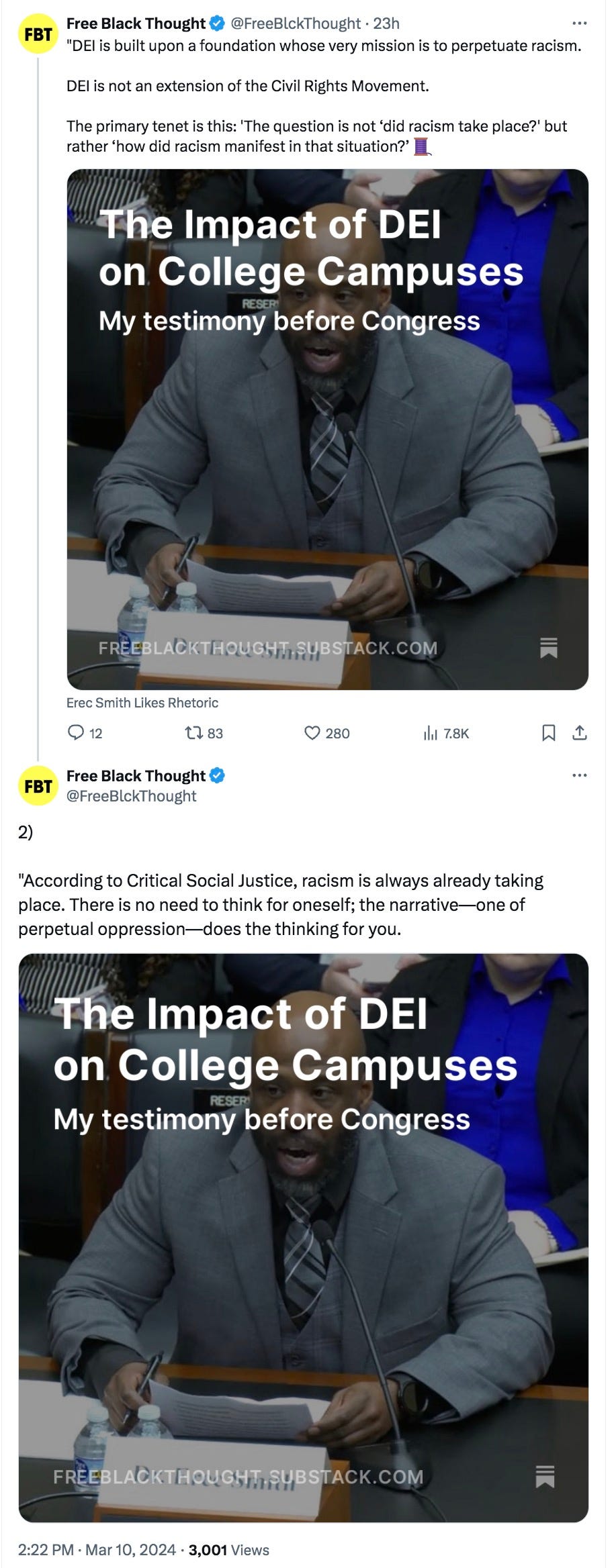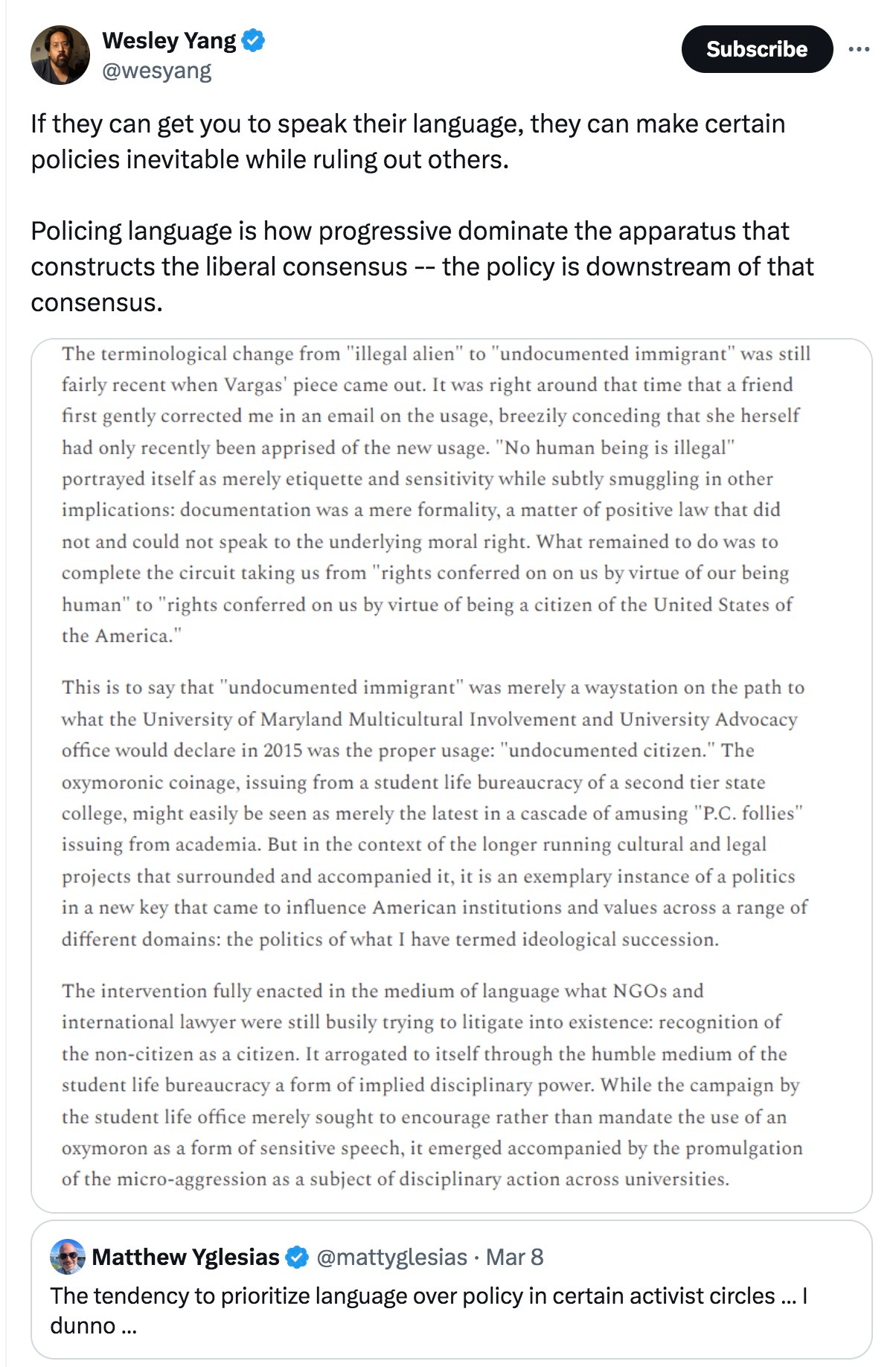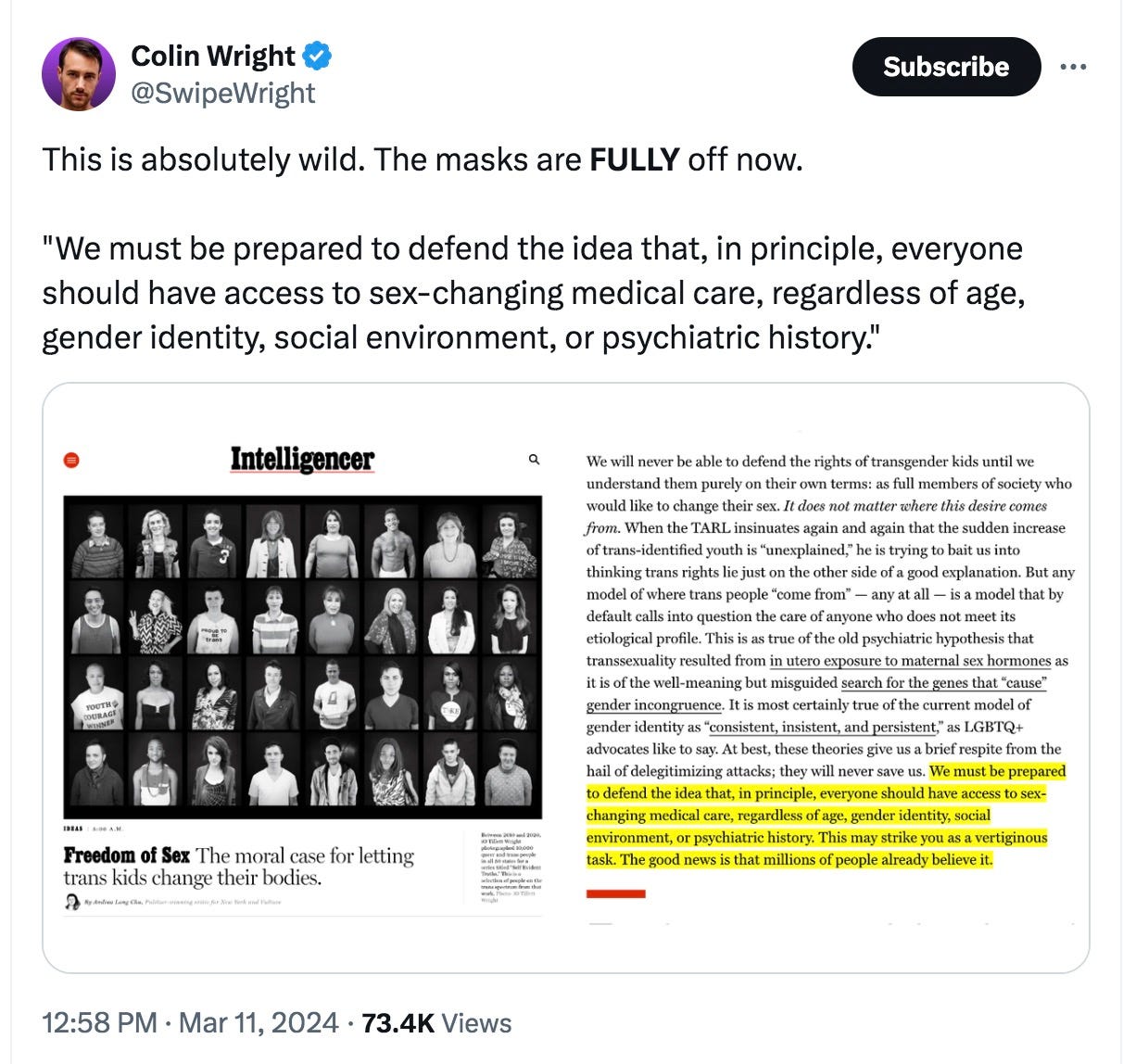E-Pluribus | March 11, 2024
Journalism and religion; everybody just calm down; and how Hamas inflates the casualty count.
A round-up of the latest and best musings on the rise of illiberalism in the public discourse:
Andrew T. Walker: Journalism Has a Religion Problem
Journalists clearly cannot be experts on every topic they cover. For that reason, they should approach every issue with a certain degree of detachment and neutrality. Writing for National Review, Andrew Walker says mainstream journalists are especially bad at this when it comes to religion—assuming they are striving for objectivity in the first place.
Journalism has a religion problem. More specifically, journalists are either unaware or unwilling to admit that their own views, presumably untouched by “religion,” are nonetheless passionately held convictions grounded, well, somewhere. What do I mean by that? Well, journalism that touches on religion and politics tends to see religious viewpoints as carrying a special burden. It goes something like this: “Tell me, Mr. Pious, why a diverse population should accept your views on morality, considering they come from religion.”
I’ve had two interactions like this myself when speaking with journalists about religion, politics, and ethics. For example, I was once asked why it would be okay for a Christian florist to decline making flowers for a same-sex wedding. I was asked, “Is that not imposing someone’s religious values on someone else?” I recall telling this journalist, “Well, the florist’s views are surely grounded in religion, but her views about marriage are not exclusively religious. This is a debate about what marriage is, not whether my religious claim is accurate or immediately relevant to the conflict at hand. In effect, this is a debate about a moral good that surely is grounded in theological realities from my perspective, but not limited to theological realities alone.” The crux of the issue, however, is that because the reporter saw a bright “religion” sign hanging over my head, she used that to force her own biases about secular neutrality on me. She did not see that her secular viewpoint about gay marriage was an imposition on me, though it was. As these types of debates get framed, it was okay for the florist to have her conscience mocked and punished. What could not happen was expecting the same-sex couple to act like adults and patronize a different florist in the marketplace, one that had no scruples about arranging flowers for a same-sex wedding.
Then, just last week, I was interviewed by Vox about the IVF ruling in Alabama. The reporter framed my position as exclusively religious in nature. While I have no problem confessing that my viewpoint ultimately stems from a religious foundation, I was clear in my response that the issue at hand, the morality of IVF, can be debated without immediate reference to religion. That’s why in my response I focused less on the fact that I believe embryos are made in God’s image (someone may disagree with that on religious grounds) and more on the fact that, biologically and philosophically, the question of whether an embryo is a human being is not up for debate. As I said in my interview, everyone was once an embryo. That’s not a religious claim.
This sentiment also comes on the heels of a now much-discussed episode in which Politico journalist Heidi Przybyla put her foot in her mouth while scoffing at the idea of rights coming from God — you know, the very idea that our Declaration of Independence states at the outset. Przybyla has since tried to walk back her statements. But in doing so, she does the very thing that plagues journalism when it ventures into religion: She assumes that nonreligious viewpoints enjoy a special place of privilege and that religious viewpoints must clear a higher hurdle in order to enter the public arena (except in those areas, of course, where religious teaching aligns with a traditionally left-wing policy ideal). In effect, she seems unwilling to acknowledge that secular viewpoints come chock-full of their own assumptions about morality. Because these assumptions are untainted by God-talk, they immediately get moved to the front of the line for public discourse. The religious troglodytes need to stand in the back.
[. . .]
I want to go on record agreeing with what Przybyla says here. I’ve tried to do the very thing she calls for. But guess what? No matter how reasonable, rational, and calm I may appear, journalists still want to treat the moral claim I’m making as some eccentric religious principle. She commits the very problem I’m speaking out against: She sees religious-based arguments as religious only. I understand why she might say this. But here’s what is also important to state: Christians believe that any moral claim the Bible makes can, in principle, be debated and understood by the non-Christian. Call this whatever you want — “creation order,” “general revelation,” “natural law” — Christians believe that in all persons a deposit of morality exists that allows them some access to moral realities.
Przybyla ends by saying something I want to affirm: “Those who complain must recognize that in a pluralistic society people on the other side of policy debates have religious or idealistic convictions every bit as sincere as their own.” She is right about this. The 20th century theologian Henry Van Til once observed that “culture is religion externalized.” His claim is relevant here. Culture is merely the outward movement of deep convictions. In that sense, everyone is religious, even if what counts as “religious” is not strictly divine. But every viewpoint about every debate on how to order our lives together in a liberal democracy comes from somewhere.
Read the whole thing.
Jonah Goldberg: Apocalypse Not
In his latest G-File for The Dispatch, Jonah Goldberg tells both Trump and Biden supporters, as well as opponents of both, to leave their hair on their heads where it belongs (though not in those exact words). Goldberg rejects the notion that one president or another will “destroy America” and urges us to embrace that perspective if we wish to live happy, productive lives.
Five years from now, America will be okay. You’ll probably be okay. And if you are not okay, it will in all likelihood have nothing to do with who was elected president in 2024.
Those of you who think I’m trying to reassure anti-Trump people (like me), despondent over the prospect of another Trump presidency, you’re right. But I’m also talking even more to pro-Trump folks, convinced that America can’t survive four more years of Joe Biden.
All of you need to get off the ledge.
[. . .]
The point here isn’t to defend Joe Biden. Okay, maybe it is—but only against the charge of destroying America and related nonsense. I didn’t like Barack Obama’s presidency, but he didn’t destroy America, either. Nor did George W. Bush, who was often denounced with similar language from the left. In fact, looking over the long list of American presidents, good and bad, none of them destroyed America.
And just in case you missed the point: Donald Trump didn’t save America, but he didn’t destroy it either.
Look out the window if you don’t believe me.
I’ve been arguing for my entire adult life that presidents don’t matter as much as presidents—and the journalists who write about them—want you to believe. Presidents don’t have a machine in the basement that “creates jobs.” They’re not America’s father. They’re not the embodiment of the American spirit or the voice of the American people. Yes, as a practical matter, they do speak for the U.S. government on the international stage. But domestically, they run just one of the three branches of the federal government, which itself is only one of the governments in American life. What governors, state legislatures, and mayors do often has as much—and sometimes more—influence over the quality of life of Americans. But their influence over your life probably pales compared to that of your boss, your colleagues, friends, doctor, and, of course, your family. Changing technology very often has a bigger impact on employment and life-quality than government regulation.
Look back on your own life. How responsible was the occupant of the Oval Office for the highs or lows? For some people, it probably mattered a lot. If you were in the military or worked for a government agency, you can surely point to some stuff.
In short, presidents are important. They have outsized influence in all sorts of ways. But in general, if you’ve invested a huge amount of meaning in the presidency, that’s a choice, not a necessity.
Read it all here.
Abraham Wyner: How the Gaza Ministry of Health Fakes Casualty Numbers
Since the October 7th attack on Israel, the Hamas-controlled Gaza health ministry reports that Israel has killed some 30,000 civilians in Gaza, most of them women and children. While some claim those figures have proven accurate in past conflicts, the Wharton School’s Abraham Wyner writes at Tablet Magazine that there is good reason for a healthy degree of skepticism.
Editor’s Note: Pluribus published an item on Monday about how the Biden White House has come around to using Hamas’s figures.
The number of civilian casualties in Gaza has been at the center of international attention since the start of the war. The main source for the data has been the Hamas-controlled Gaza Health Ministry, which now claims more than 30,000 dead, the majority of which it says are children and women. Recently, the Biden administration lent legitimacy to Hamas’ figure. When asked at a House Armed Services Committee hearing last week how many Palestinian women and children have been killed since Oct. 7, Secretary of Defense Lloyd Austin said the number was “over 25,000.” The Pentagon quickly clarified that the secretary “was citing an estimate from the Hamas-controlled Health Ministry.” President Biden himself had earlier cited this figure, asserting that “too many, too many of the over 27,000 Palestinians killed in this conflict have been innocent civilians and children, including thousands of children.” The White House also explained that the president “was referring to publicly available data about the total number of casualties.”
Here’s the problem with this data: The numbers are not real. That much is obvious to anyone who understands how naturally occurring numbers work. The casualties are not overwhelmingly women and children, and the majority may be Hamas fighters.
If Hamas’ numbers are faked or fraudulent in some way, there may be evidence in the numbers themselves that can demonstrate it. While there is not much data available, there is a little, and it is enough: From Oct. 26 until Nov. 10, 2023, the Gaza Health Ministry released daily casualty figures that include both a total number and a specific number of women and children.
[. . .]
The graph reveals an extremely regular increase in casualties over the period. Data aggregated by the author and provided by the United Nations Office for the Coordination of Humanitarian Affairs (OCHA), based on Gaza MoH figures.
This regularity is almost surely not real. One would expect quite a bit of variation day to day. In fact, the daily reported casualty count over this period averages 270 plus or minus about 15%. This is strikingly little variation. There should be days with twice the average or more and others with half or less. Perhaps what is happening is the Gaza ministry is releasing fake daily numbers that vary too little because they do not have a clear understanding of the behavior of naturally occurring numbers. Unfortunately, verified control data is not available to formally test this conclusion, but the details of the daily counts render the numbers suspicious.
Similarly, we should see variation in the number of child casualties that tracks the variation in the number of women. This is because the daily variation in death counts is caused by the variation in the number of strikes on residential buildings and tunnels which should result in considerable variability in the totals but less variation in the percentage of deaths across groups. This is a basic statistical fact about chance variability.
Read it all.
Around Twitter (X)
Free Black Thought has a thread with a few excerpts from Erec Smith’s testimony before Congress on DEI. Click for the whole thing.
Matt Yglesias is skeptical of the focus on language by some activists, but Wesley Yang says there’s sound logic behind this approach:
And finally, New York Magazine has a new article out arguing for complete “freedom of sex” for children who want gender surgery. Colin Wright is appalled.











